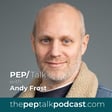
With Rachel Jordan-Wolf
After the Covid pandemic, we've all had enough of statistics! But sometimes they can reveal amazing surprises about things we take for granted. Today Gavin Matthews learns more about the fascinating "Talking Jesus" report, which tells us so much about the nuances of faith in the UK and the untapped opportunities for sharing Jesus today.
Find out more about the Talking Jesus research here and watch a summary on YouTube here. The Talking Jesus course for churches is here.
Dr Rachel Jordan-Wolf is passionate about sharing the gospel of Jesus and has worked for various churches and mission agencies in places such as London and Amsterdam. She’s involved in a church plant in London and is a adjunct lecturer in mission in the UK. She holds a PhD in Church History, focussing on women in mission in early 20th Century Britain. She has been an advisor for the Church of England on mission. Rachel is the Executive Director of Hope Together - a ministry which works with local churches to share the gospel of Jesus. She also loves chocolate!



















